The Cambridge History of China. Vol. 13: Republican China 1912-1949, Part 2
Подождите немного. Документ загружается.

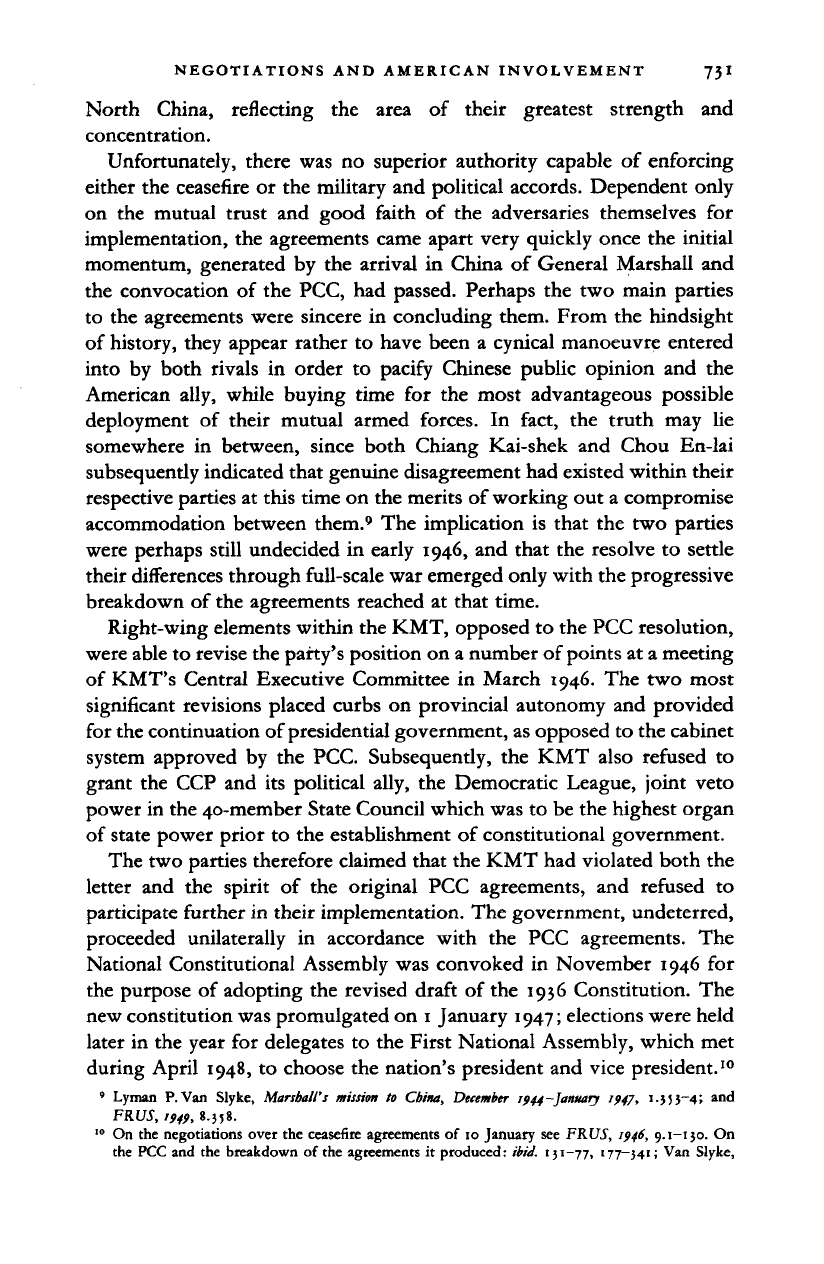
NEGOTIATIONS
AND
AMERICAN INVOLVEMENT
73I
North
China,
reflecting the area of their greatest strength and
concentration.
Unfortunately,
there was no superior authority capable of enforcing
either the ceasefire or the military and political accords. Dependent only
on the mutual trust and good faith of the adversaries themselves for
implementation, the agreements came apart very quickly once the initial
momentum, generated by the arrival in
China
of General Marshall and
the convocation of the
PCC,
had passed. Perhaps the two main parties
to the agreements were sincere in concluding them. From the hindsight
of history, they appear rather to have been a cynical manoeuvre entered
into by both rivals in order to pacify Chinese public opinion and the
American
ally, while buying time for the most advantageous possible
deployment of their mutual armed forces. In fact, the truth may lie
somewhere in between,
since
both
Chiang
Kai-shek and
Chou
En-lai
subsequently indicated that genuine disagreement had existed within their
respective parties at this time on the merits of working out a compromise
accommodation between them.
9
The implication is that the two parties
were perhaps still undecided in early 1946, and that the resolve to
settle
their differences through full-scale war emerged only with the progressive
breakdown
of the agreements reached at that time.
Right-wing
elements
within the
KMT,
opposed to the
PCC
resolution,
were able to revise the party's position on a number of points at a meeting
of
KMT's
Central
Executive Committee in
March
1946. The two most
significant revisions placed curbs on provincial autonomy and provided
for the continuation of presidential government, as opposed to the cabinet
system approved by the
PCC.
Subsequently, the KMT
also
refused to
grant
the CCP and its political ally, the Democratic League, joint veto
power in the 40-member State Council which was to be the highest organ
of state power prior to the establishment of constitutional government.
The
two parties therefore claimed that the KMT had violated both the
letter and the spirit of the original PCC agreements, and refused to
participate
further in their implementation. The government, undeterred,
proceeded unilaterally in accordance with the PCC agreements. The
National
Constitutional Assembly was convoked in November 1946 for
the purpose of adopting the revised draft of the 1936 Constitution. The
new constitution was promulgated on 1 January 1947;
elections
were held
later in the year for delegates to the First National Assembly, which met
during
April
1948, to
choose
the nation's president and vice president.
10
•
Lyman
P. Van
Slyke,
Marshall's
mission
to China, December
1)44
-January
1947,
1.555-4;
and
FRUS,
1949,
8.558.
10
On the negotiations over the ceasefire agreements of 10 January see
FRUS,
1946,
9.1-150.
On
the
PCC
and the breakdown of the agreements it produced:
ibid.
151-77, 177-541;
Van
Slyke,
Cambridge Histories Online © Cambridge University Press, 2008
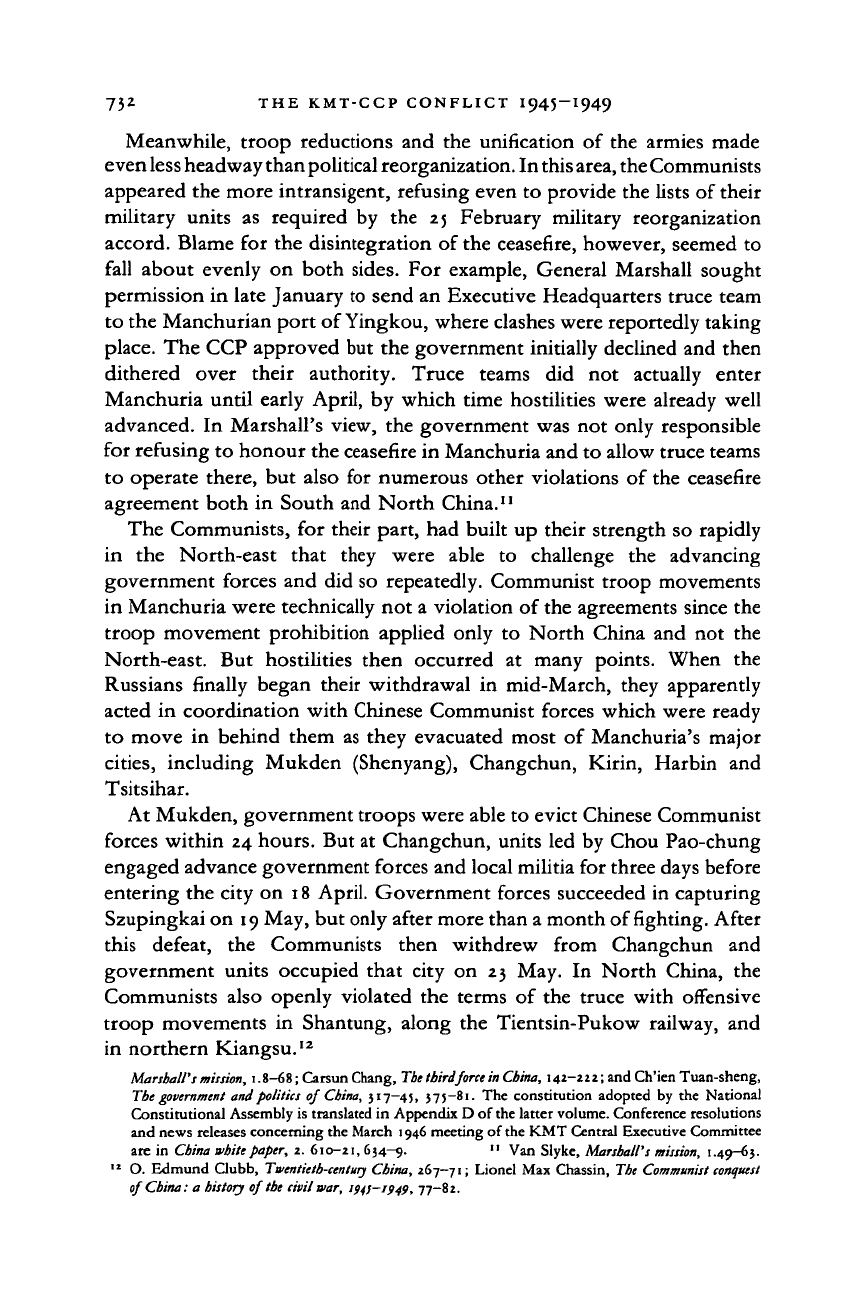
73
2
THE KMT-CCP CONFLICT I945-I949
Meanwhile, troop reductions and the unification
of
the armies made
even
less
headway than political reorganization. In this
area,
the Communists
appeared the more intransigent, refusing even to provide the lists of their
military units
as
required by
the 25
February military reorganization
accord. Blame for the disintegration of the ceasefire, however, seemed to
fall about evenly on both sides. For example, General Marshall sought
permission in late January to send an Executive Headquarters truce team
to the Manchurian port of Yingkou, where clashes were reportedly taking
place. The CCP approved but the government initially declined and then
dithered over their authority. Truce teams
did not
actually enter
Manchuria until early April, by which time hostilities were already well
advanced. In Marshall's view, the government was not only responsible
for refusing to honour the ceasefire in Manchuria and to allow truce teams
to operate there, but also for numerous other violations of the ceasefire
agreement both in South and North China.
11
The Communists, for their part, had built up their strength so rapidly
in
the
North-east that they were able
to
challenge
the
advancing
government forces and did so repeatedly. Communist troop movements
in Manchuria were technically not a violation of the agreements since the
troop movement prohibition applied only
to
North China and not the
North-east.
But
hostilities then occurred
at
many points. When
the
Russians finally began their withdrawal
in
mid-March, they apparently
acted in coordination with Chinese Communist forces which were ready
to move
in
behind them as they evacuated most
of
Manchuria's major
cities,
including Mukden (Shenyang), Changchun, Kirin, Harbin and
Tsitsihar.
At Mukden, government troops were able to evict Chinese Communist
forces within 24 hours. But at Changchun, units led by Chou Pao-chung
engaged advance government forces and local militia for three days before
entering the city on 18 April. Government forces succeeded in capturing
Szupingkai on 19 May, but only after more than a month of fighting. After
this defeat,
the
Communists then withdrew from Changchun
and
government units occupied that city on 23 May.
In
North China,
the
Communists also openly violated the terms
of
the truce with offensive
troop movements
in
Shantung, along the Tientsin-Pukow railway, and
in northern Kiangsu.
12
Marshall'smission,
i.8-68;CarsunChang,
Thetbirdforcein
China,
142—222;andCh'ienTuan-sheng,
The government and politics
of
China,
317—45,
375-81.
The constitution adopted by the National
Constitutional Assembly is translated in Appendix D of the latter volume. Conference resolutions
and news releases concerning the March 1946 meeting of the KMT Central Executive Committee
are in
China white
paper,
2.
610-21,
634-9.
"
Van Slyke,
Marshall's
mission,
1.49-63.
12
O. Edmund Clubb, Twentieth-century China,
267-71;
Lionel Max Chassin, The Communist
conquest
of China:
a
history of the civil war, im—1949, 77—82.
Cambridge Histories Online © Cambridge University Press, 2008
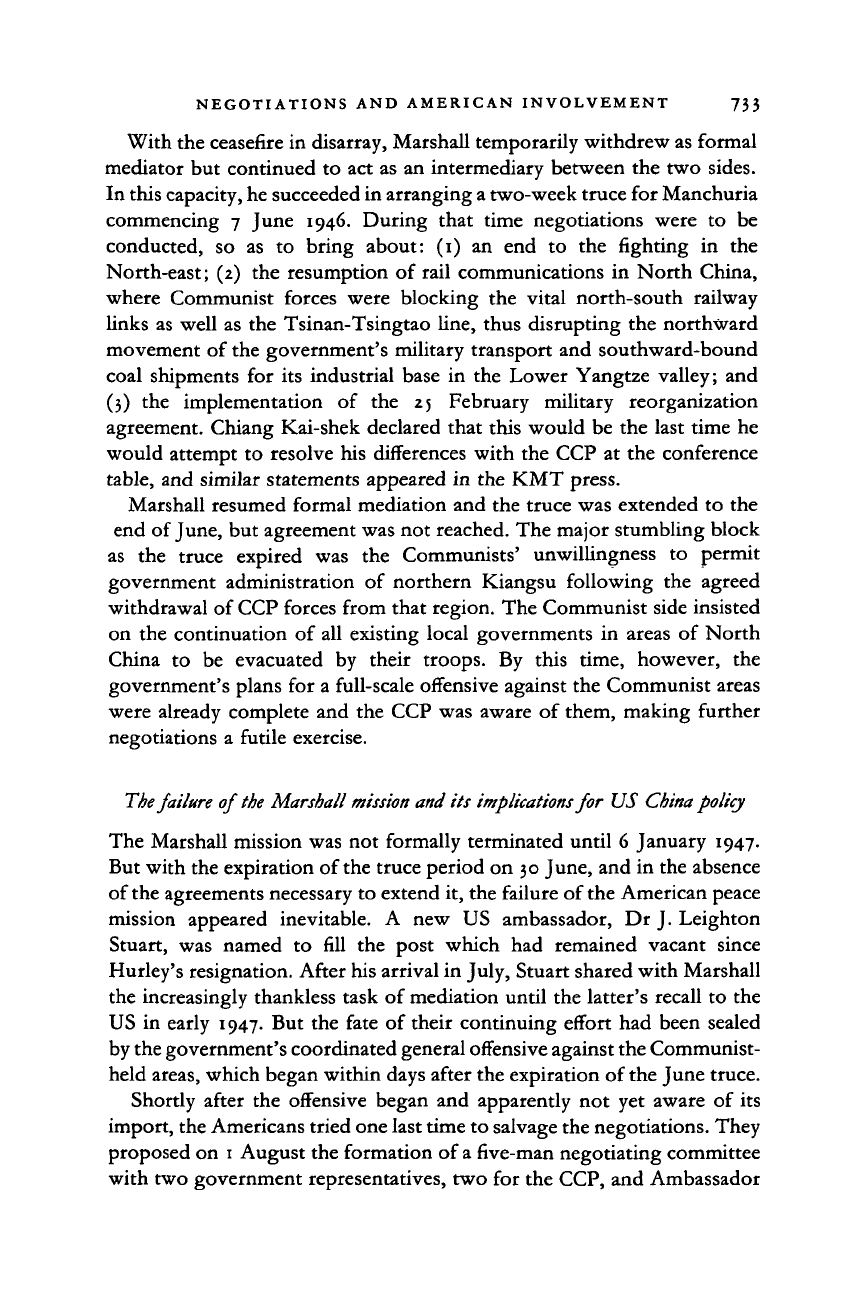
NEGOTIATIONS AND AMERICAN INVOLVEMENT 733
With the ceasefire in disarray, Marshall temporarily withdrew as formal
mediator but continued to act as an intermediary between the two sides.
In this capacity, he succeeded in arranging a two-week truce for Manchuria
commencing 7 June 1946. During that time negotiations were to be
conducted, so as to bring about: (1) an end to the fighting in the
North-east; (2) the resumption of rail communications in North China,
where Communist forces were blocking the vital north-south railway
links as well as the Tsinan-Tsingtao line, thus disrupting the northward
movement of the government's military transport and southward-bound
coal shipments for its industrial base in the Lower Yangtze valley; and
(3) the implementation of the 25 February military reorganization
agreement. Chiang Kai-shek declared that this would be the last time he
would attempt to resolve his differences with the CCP at the conference
table, and similar statements appeared in the KMT press.
Marshall resumed formal mediation and the truce was extended to the
end of
June,
but agreement was not reached. The major stumbling block
as the truce expired was the Communists' unwillingness to permit
government administration of northern Kiangsu following the agreed
withdrawal of CCP forces from that region. The Communist side insisted
on the continuation of all existing local governments in areas of North
China to be evacuated by their troops. By this time, however, the
government's plans for a full-scale offensive against the Communist areas
were already complete and the CCP was aware of them, making further
negotiations a futile exercise.
The failure of
the
Marshall
mission
and its implications for US
China
policy
The Marshall mission was not formally terminated until 6 January 1947.
But with the expiration of the truce period on 30 June, and in the absence
of the agreements necessary to extend it, the failure of the American peace
mission appeared inevitable. A new US ambassador, Dr J. Leighton
Stuart, was named to fill the post which had remained vacant since
Hurley's resignation. After his arrival in July, Stuart shared with Marshall
the increasingly thankless task of mediation until the latter's recall to the
US in early 1947. But the fate of their continuing effort had been sealed
by the government's coordinated general offensive against the Communist-
held areas, which began within days after the expiration of the June truce.
Shortly after the offensive began and apparently not yet aware of its
import, the Americans tried one last time to salvage the negotiations. They
proposed on
1
August the formation of
a
five-man negotiating committee
with two government representatives, two for the CCP, and Ambassador
Cambridge Histories Online © Cambridge University Press, 2008
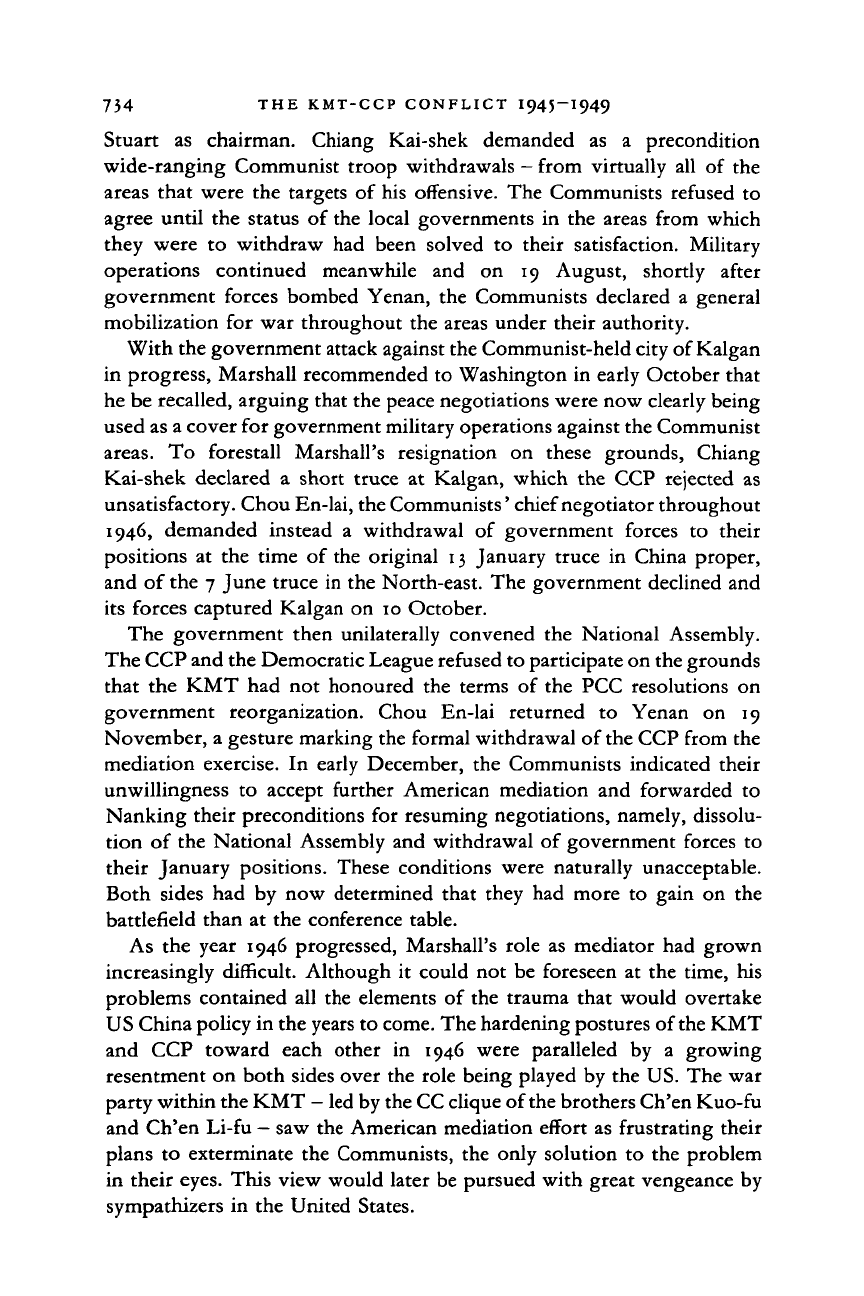
734 THE KMT-CCP CONFLICT I945-I949
Stuart
as
chairman. Chiang Kai-shek demanded
as a
precondition
wide-ranging Communist troop withdrawals
-
from virtually
all of
the
areas that were the targets
of
his offensive. The Communists refused
to
agree until the status
of
the local governments
in
the areas from which
they were
to
withdraw had been solved
to
their satisfaction. Military
operations continued meanwhile
and on 19
August, shortly after
government forces bombed Yenan, the Communists declared
a
general
mobilization for war throughout the areas under their authority.
With the government attack against the Communist-held city of Kalgan
in progress, Marshall recommended to Washington in early October that
he be recalled, arguing that the peace negotiations were now clearly being
used as a cover for government military operations against the Communist
areas.
To
forestall Marshall's resignation
on
these grounds, Chiang
Kai-shek declared
a
short truce
at
Kalgan, which the CCP rejected
as
unsatisfactory. Chou En-lai, the Communists' chief negotiator throughout
1946,
demanded instead
a
withdrawal
of
government forces
to
their
positions
at
the time
of
the original 13 January truce
in
China proper,
and of the 7 June truce in the North-east. The government declined and
its forces captured Kalgan on 10 October.
The government then unilaterally convened the National Assembly.
The CCP and the Democratic League refused to participate on the grounds
that the KMT had not honoured the terms
of
the PCC resolutions
on
government reorganization. Chou En-lai returned
to
Yenan
on 19
November, a gesture marking the formal withdrawal of the CCP from the
mediation exercise.
In
early December, the Communists indicated their
unwillingness
to
accept further American mediation and forwarded
to
Nanking their preconditions for resuming negotiations, namely, dissolu-
tion
of
the National Assembly and withdrawal
of
government forces
to
their January positions. These conditions were naturally unacceptable.
Both sides had
by
now determined that they had more
to
gain
on the
battlefield than
at
the conference table.
As the year 1946 progressed, Marshall's role
as
mediator had grown
increasingly difficult. Although
it
could not be foreseen
at
the time,
his
problems contained all the elements
of
the trauma that would overtake
US China policy in the years to come. The hardening postures of the KMT
and CCP toward each other
in
1946 were paralleled
by a
growing
resentment on both sides over the role being played by the US. The war
party within the KMT
-
led by the CC clique of the brothers Ch'en Kuo-fu
and Ch'en Li-fu
-
saw the American mediation effort as frustrating their
plans
to
exterminate the Communists, the only solution
to
the problem
in their eyes. This view would later be pursued with great vengeance by
sympathizers
in
the United States.
Cambridge Histories Online © Cambridge University Press, 2008
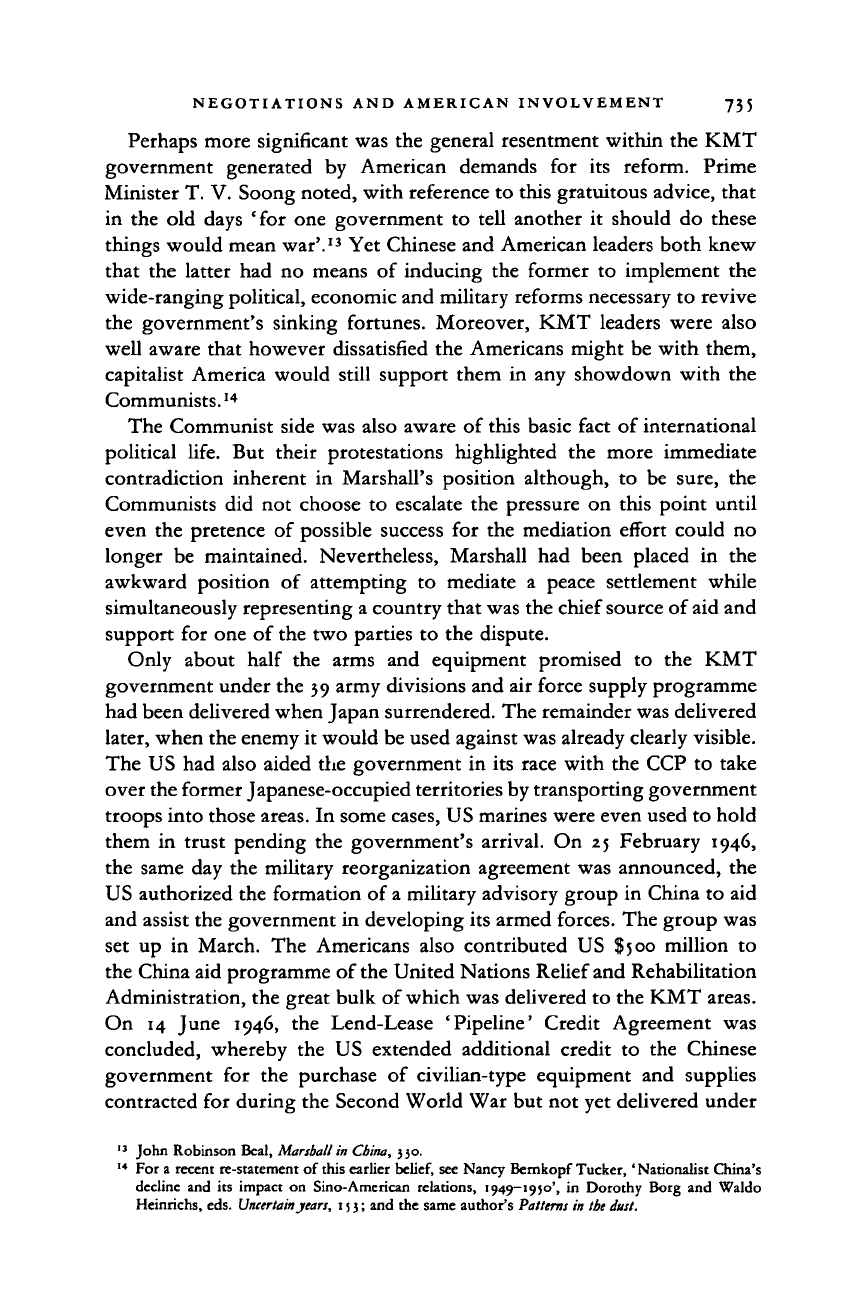
NEGOTIATIONS AND AMERICAN INVOLVEMENT 735
Perhaps more significant was the general resentment within the KMT
government generated by American demands for its reform. Prime
Minister T. V. Soong noted, with reference to this gratuitous advice, that
in the old days 'for one government to tell another it should do these
things would mean war'.
13
Yet Chinese and American leaders both knew
that the latter had no means of inducing the former to implement the
wide-ranging political, economic and military reforms necessary to revive
the government's sinking fortunes. Moreover, KMT leaders were also
well aware that however dissatisfied the Americans might be with them,
capitalist America would still support them in any showdown with the
Communists.
14
The Communist side was also aware of this basic fact of international
political life. But their protestations highlighted the more immediate
contradiction inherent in Marshall's position although, to be sure, the
Communists did not choose to escalate the pressure on this point until
even the pretence of possible success for the mediation effort could no
longer be maintained. Nevertheless, Marshall had been placed in the
awkward position of attempting to mediate a peace settlement while
simultaneously representing a country that was the chief source of aid and
support for one of the two parties to the dispute.
Only about half the arms and equipment promised to the KMT
government under the 39 army divisions and air force supply programme
had been delivered when Japan surrendered. The remainder was delivered
later, when the enemy it would be used against was already clearly visible.
The US had also aided the government in its race with the CCP to take
over the former Japanese-occupied territories by transporting government
troops into those areas. In some cases, US marines were even used to hold
them in trust pending the government's arrival. On 25 February 1946,
the same day the military reorganization agreement was announced, the
US authorized the formation of a military advisory group in China to aid
and assist the government in developing its armed forces. The group was
set up in March. The Americans also contributed US $500 million to
the China aid programme of the United Nations Relief and Rehabilitation
Administration, the great bulk of which was delivered to the KMT areas.
On 14 June 1946, the Lend-Lease 'Pipeline' Credit Agreement was
concluded, whereby the US extended additional credit to the Chinese
government for the purchase of civilian-type equipment and supplies
contracted for during the Second World War but not yet delivered under
13
John Robinson Beal, Marshall in China, 330.
14
For a recent re-statement of this earlier
belief,
see Nancy Bernkopf Tucker,' Nationalist China's
decline and its impact on Sino-American relations, 1949—1950', in Dorothy Borg and Waldo
Heinrichs, eds. Uncertain years, 153; and the same author's Patterns in the dust.
Cambridge Histories Online © Cambridge University Press, 2008
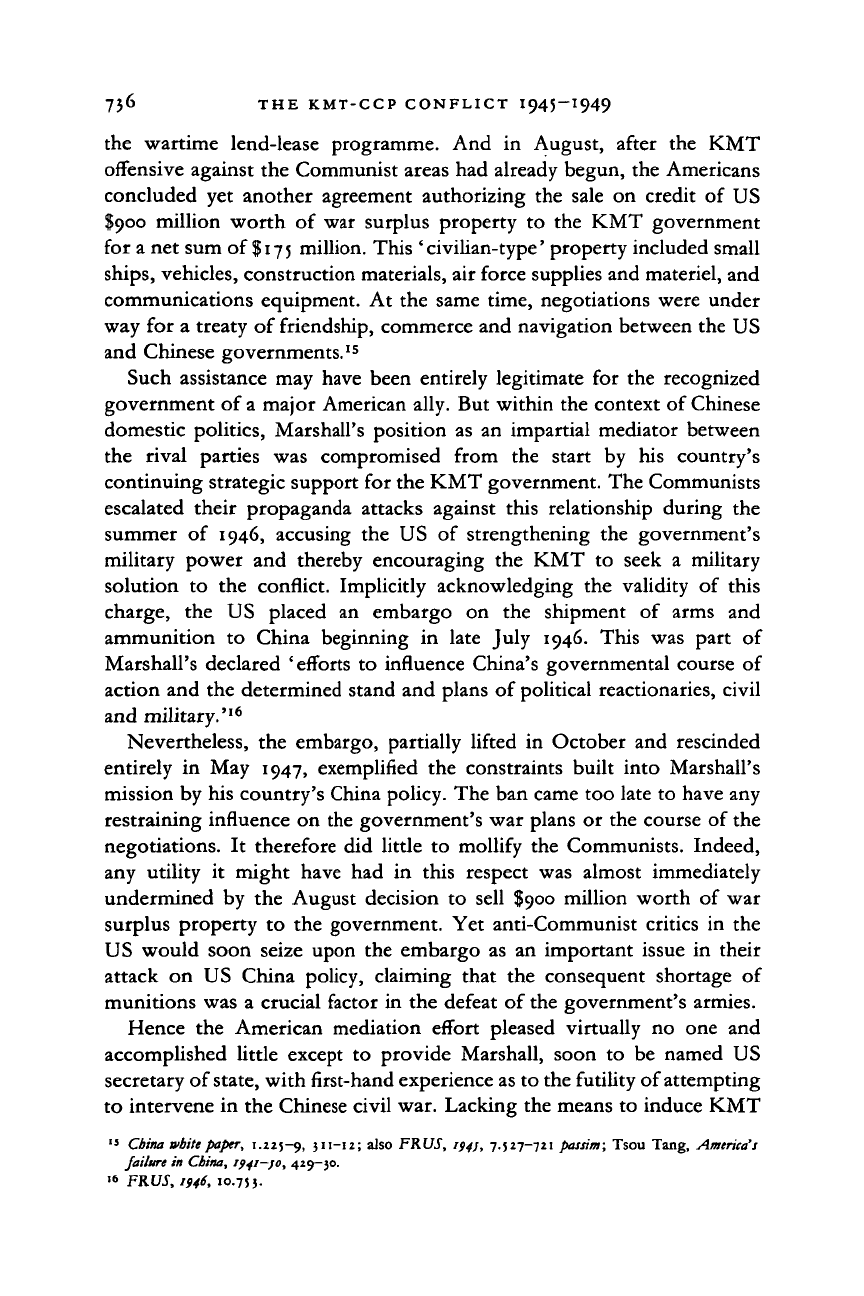
THE KMT-CCP CONFLICT I945-I949
the wartime lend-lease programme.
And
in
August, after
the KMT
offensive against
the
Communist areas
had
already begun,
the
Americans
concluded
yet
another agreement authorizing
the
sale
on
credit
of US
$900 million worth
of war
surplus property
to the KMT
government
for
a net sum of
$175
million. This 'civilian-type' property included small
ships,
vehicles, construction materials,
air
force supplies
and
materiel,
and
communications equipment.
At the
same time, negotiations were under
way
for a
treaty
of
friendship, commerce
and
navigation between
the US
and Chinese governments.
15
Such assistance
may
have been entirely legitimate
for the
recognized
government
of
a major American ally.
But
within
the
context
of
Chinese
domestic politics, Marshall's position
as an
impartial mediator between
the rival parties
was
compromised from
the
start
by
his
country's
continuing strategic support
for
the KMT government.
The
Communists
escalated their propaganda attacks against this relationship during
the
summer
of
1946,
accusing
the US
of
strengthening
the
government's
military power
and
thereby encouraging
the KMT to
seek
a
military
solution
to
the
conflict. Implicitly acknowledging
the
validity
of
this
charge,
the
US
placed
an
embargo
on
the
shipment
of
arms
and
ammunition
to
China beginning
in
late July
1946.
This
was
part
of
Marshall's declared 'efforts
to
influence China's governmental course
of
action
and the
determined stand
and
plans
of
political reactionaries, civil
and military.'
16
Nevertheless,
the
embargo, partially lifted
in
October
and
rescinded
entirely
in May 1947,
exemplified
the
constraints built into Marshall's
mission
by his
country's China policy.
The ban
came
too
late
to
have
any
restraining influence
on the
government's
war
plans
or the
course
of the
negotiations.
It
therefore
did
little
to
mollify
the
Communists. Indeed,
any utility
it
might have
had
in
this respect
was
almost immediately
undermined
by the
August decision
to
sell $900 million worth
of war
surplus property
to the
government.
Yet
anti-Communist critics
in the
US would soon seize upon
the
embargo
as an
important issue
in
their
attack
on US
China policy, claiming that
the
consequent shortage
of
munitions
was a
crucial factor
in the
defeat
of
the government's armies.
Hence
the
American mediation effort pleased virtually
no one and
accomplished little except
to
provide Marshall, soon
to be
named
US
secretary of
state,
with first-hand experience as
to
the futility of attempting
to intervene
in the
Chinese civil war. Lacking
the
means
to
induce
KMT
15
China white paper, 1.225-9,
3"-'
2
;
also FRUS,
if^j,
7.527-721 passim; Tsou Tang, America's
failure in
China,
1941—jo,
429-30.
16
FRUS,
1946, 10.753.
Cambridge Histories Online © Cambridge University Press, 2008
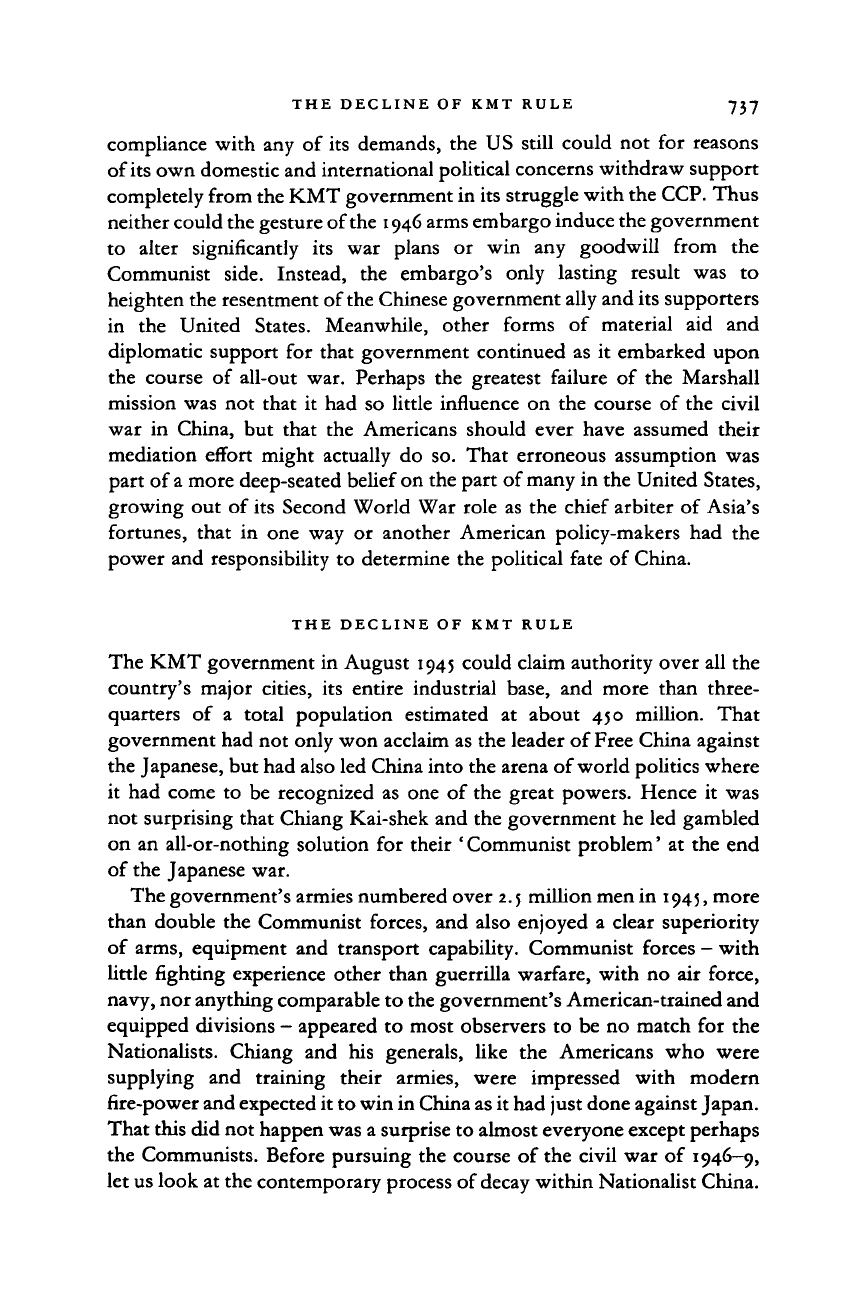
THE DECLINE OF KMT RULE 737
compliance with any of its demands, the US still could not for reasons
of its own domestic and international political concerns withdraw support
completely from the KMT government in its struggle with the CCP. Thus
neither could the gesture of the 1946 arms embargo induce the government
to alter significantly its war plans or win any goodwill from the
Communist side. Instead, the embargo's only lasting result was to
heighten the resentment of the Chinese government ally and its supporters
in the United States. Meanwhile, other forms of material aid and
diplomatic support for that government continued as it embarked upon
the course of all-out war. Perhaps the greatest failure of the Marshall
mission was not that it had so little influence on the course of the civil
war in China, but that the Americans should ever have assumed their
mediation effort might actually do so. That erroneous assumption was
part of
a
more deep-seated belief on the part of many in the United States,
growing out of its Second World War role as the chief arbiter of Asia's
fortunes, that in one way or another American policy-makers had the
power and responsibility to determine the political fate of China.
THE DECLINE OF KMT RULE
The KMT government in August 1945 could claim authority over all the
country's major cities, its entire industrial base, and more than three-
quarters of a total population estimated at about 450 million. That
government had not only won acclaim as the leader of Free China against
the Japanese, but had also led China into the arena of world politics where
it had come to be recognized as one of the great powers. Hence it was
not surprising that Chiang Kai-shek and the government he led gambled
on an all-or-nothing solution for their ' Communist problem' at the end
of the Japanese war.
The government's armies numbered over 2.5 million men in 1945, more
than double the Communist forces, and also enjoyed a clear superiority
of arms, equipment and transport capability. Communist forces - with
little fighting experience other than guerrilla warfare, with no air force,
navy, nor anything comparable to the government's American-trained and
equipped divisions - appeared to most observers to be no match for the
Nationalists. Chiang and his generals, like the Americans who were
supplying and training their armies, were impressed with modern
fire-power and expected it to win in China as it had just done against Japan.
That this did not happen was a surprise to almost everyone except perhaps
the Communists. Before pursuing the course of the civil war of 1946-9,
let us look at the contemporary process of decay within Nationalist China.
Cambridge Histories Online © Cambridge University Press, 2008
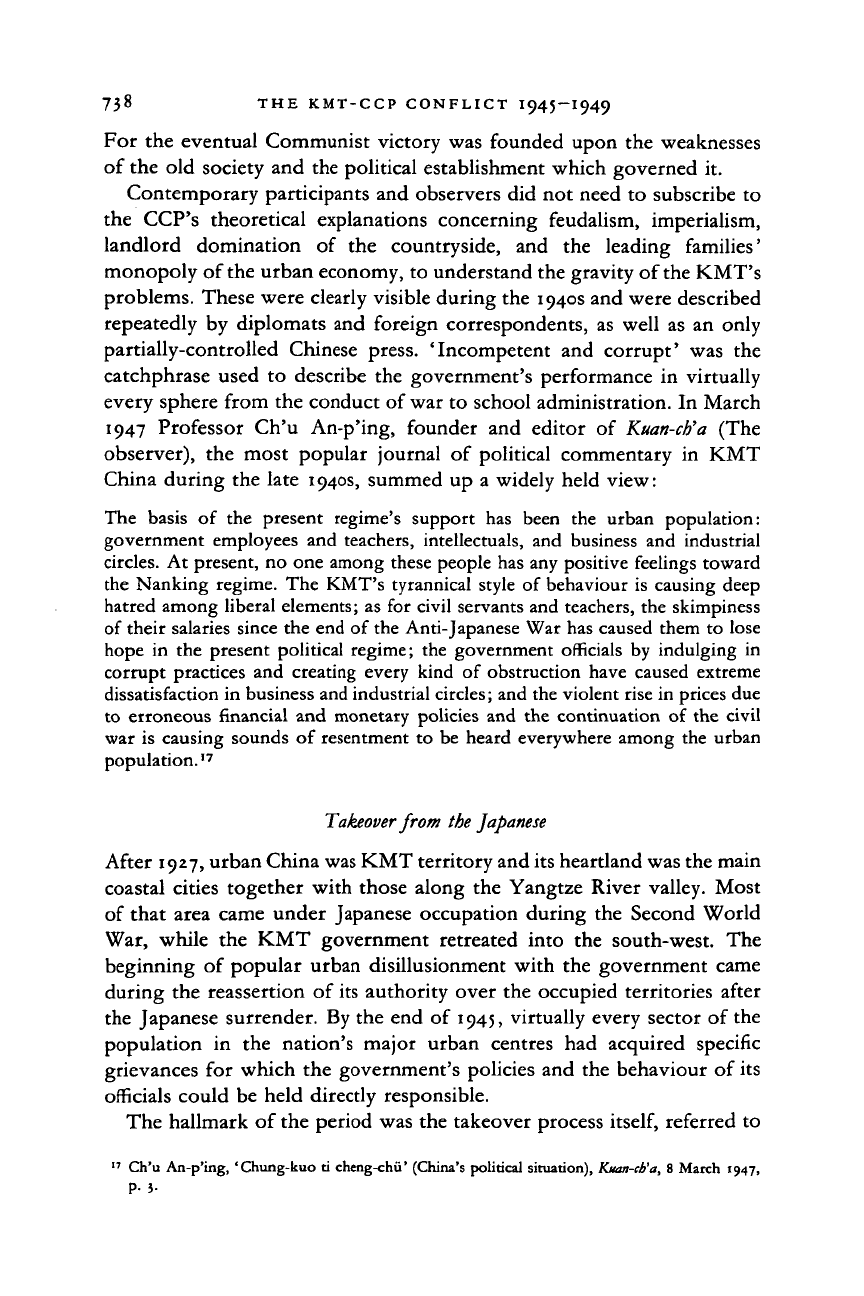
73
8
THE KMT-CCP CONFLICT I945-I949
For the eventual Communist victory was founded upon the weaknesses
of the old society and the political establishment which governed it.
Contemporary participants and observers did not need to subscribe to
the CCP's theoretical explanations concerning feudalism, imperialism,
landlord domination
of the
countryside,
and the
leading families'
monopoly of the urban economy, to understand the gravity of
the
KMT's
problems. These were clearly visible during the 1940s and were described
repeatedly by diplomats and foreign correspondents, as well as an only
partially-controlled Chinese press. 'Incompetent and corrupt' was
the
catchphrase used
to
describe the government's performance in virtually
every sphere from the conduct of war to school administration. In March
1947 Professor Ch'u An-p'ing, founder and editor
of
Kuan-ch'a
(The
observer), the most popular journal
of
political commentary
in
KMT
China during the late 1940s, summed up a widely held view:
The basis
of
the present regime's support has been the urban population:
government employees and teachers, intellectuals, and business and industrial
circles. At present, no one among these people has any positive feelings toward
the Nanking regime. The KMT's tyrannical style of behaviour is causing deep
hatred among liberal elements; as
for
civil servants and teachers, the skimpiness
of their salaries since the end of the Anti-Japanese War has caused them to lose
hope in the present political regime; the government officials by indulging in
corrupt practices and creating every kind of obstruction have caused extreme
dissatisfaction in business and industrial circles; and the violent rise in prices due
to erroneous financial and monetary policies and the continuation of the civil
war is causing sounds of resentment to be heard everywhere among the urban
population.
17
Takeover from the
Japanese
After 1927, urban China was KMT territory and its heartland was the main
coastal cities together with those along the Yangtze River valley. Most
of that area came under Japanese occupation during the Second World
War, while the KMT government retreated into the south-west. The
beginning of popular urban disillusionment with the government came
during the reassertion of its authority over the occupied territories after
the Japanese surrender. By the end
of
1945, virtually every sector of the
population
in the
nation's major urban centres had acquired specific
grievances for which the government's policies and the behaviour of its
officials could be held directly responsible.
The hallmark of the period was the takeover process
itself,
referred to
" Ch'u An-p'ing, 'Chung-kuo ti cheng-chu' (China's political situation),
Kjtan-cb'a,
8 March 1947,
p.
}.
Cambridge Histories Online © Cambridge University Press, 2008
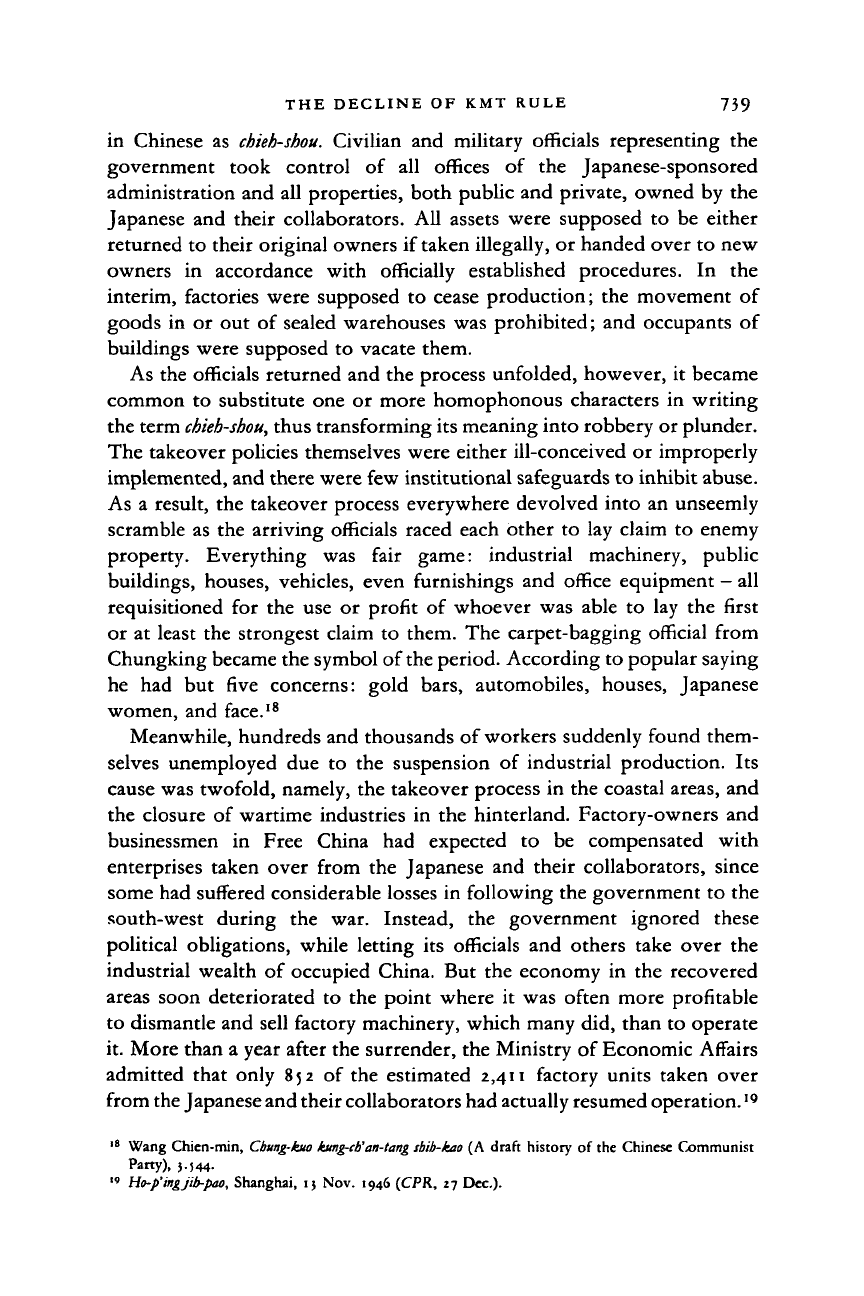
THE DECLINE OF KMT RULE 739
in Chinese
as
chieh-shou.
Civilian
and
military officials representing
the
government took control
of all
offices
of the
Japanese-sponsored
administration and all properties, both public and private, owned by the
Japanese and their collaborators. All assets were supposed
to be
either
returned to their original owners if taken illegally, or handed over to new
owners
in
accordance with officially established procedures.
In the
interim, factories were supposed
to
cease production; the movement
of
goods
in or
out
of
sealed warehouses was prohibited; and occupants
of
buildings were supposed to vacate them.
As the officials returned and the process unfolded, however,
it
became
common
to
substitute one
or
more homophonous characters
in
writing
the term
chieb-shou,
thus transforming its meaning into robbery or plunder.
The takeover policies themselves were either ill-conceived or improperly
implemented, and there were few institutional safeguards to inhibit abuse.
As
a
result, the takeover process everywhere devolved into an unseemly
scramble as the arriving officials raced each other
to
lay claim
to
enemy
property. Everything
was
fair game: industrial machinery, public
buildings, houses, vehicles, even furnishings and office equipment
-
all
requisitioned
for
the use
or
profit
of
whoever was able
to
lay the first
or
at
least the strongest claim
to
them. The carpet-bagging official from
Chungking became the symbol of
the
period. According to popular saying
he
had but
five concerns: gold bars, automobiles, houses, Japanese
women, and face.
18
Meanwhile, hundreds and thousands of workers suddenly found them-
selves unemployed due
to the
suspension
of
industrial production.
Its
cause was twofold, namely, the takeover process in the coastal areas, and
the closure
of
wartime industries
in
the hinterland. Factory-owners and
businessmen
in
Free China
had
expected
to be
compensated with
enterprises taken over from the Japanese and their collaborators, since
some had suffered considerable losses in following the government to the
south-west during
the war.
Instead,
the
government ignored these
political obligations, while letting
its
officials and others take over
the
industrial wealth
of
occupied China. But the economy
in
the recovered
areas soon deteriorated
to
the point where
it
was often more profitable
to dismantle and sell factory machinery, which many did, than to operate
it. More than a year after the surrender, the Ministry of Economic Affairs
admitted that only 852
of
the estimated 2,411 factory units taken over
from the Japanese and their collaborators had actually resumed operation.
I9
18
Wang Chien-min,
Chung-kxo kung-cb'an-tang sbib-kao
(A draft history
of
the Chinese Communist
Patty),
3.544.
"
Ho-p'ingjib-pao,
Shanghai, 13 Nov. 1946 (CPR, 27 Dec.)-
Cambridge Histories Online © Cambridge University Press, 2008
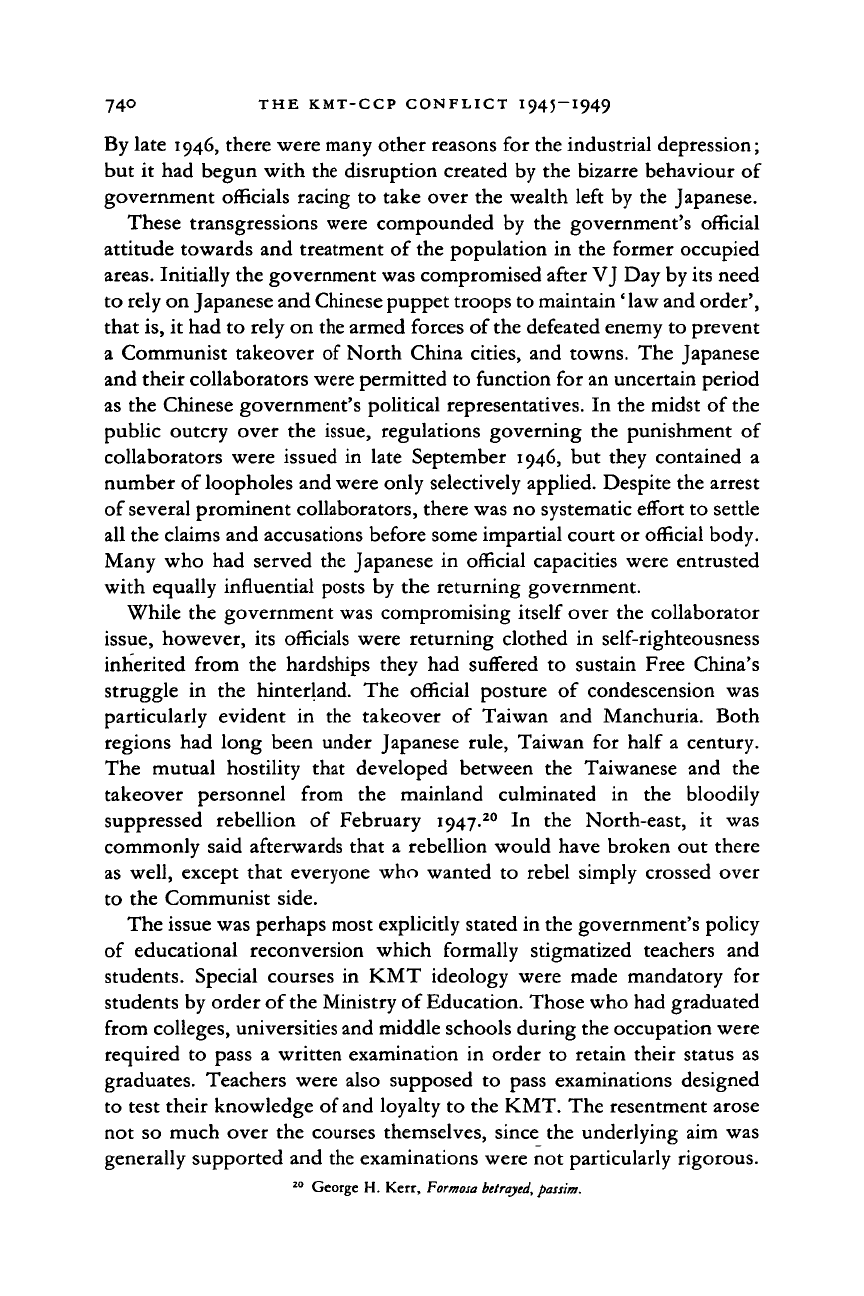
74° THE KMT-CCP CONFLICT I945-I949
By late 1946, there were many other reasons for the industrial depression;
but it had begun with the disruption created by the bizarre behaviour of
government officials racing to take over the wealth left by the Japanese.
These transgressions were compounded by the government's official
attitude towards and treatment of the population in the former occupied
areas.
Initially the government was compromised after VJ Day by its need
to rely on Japanese and Chinese puppet troops to maintain' law and order',
that is, it had to rely on the armed forces of the defeated enemy to prevent
a Communist takeover of North China cities, and towns. The Japanese
and their collaborators were permitted to function for an uncertain period
as the Chinese government's political representatives. In the midst of the
public outcry over the issue, regulations governing the punishment of
collaborators were issued in late September 1946, but they contained
a
number of loopholes and were only selectively applied. Despite the arrest
of several prominent collaborators, there was no systematic effort to settle
all the claims and accusations before some impartial court or official body.
Many who had served the Japanese in official capacities were entrusted
with equally influential posts by the returning government.
While the government was compromising itself over the collaborator
issue, however, its officials were returning clothed in self-righteousness
inherited from the hardships they had suffered to sustain Free China's
struggle in the hinterland. The official posture of condescension was
particularly evident in the takeover of Taiwan and Manchuria. Both
regions had long been under Japanese rule, Taiwan for half a century.
The mutual hostility that developed between the Taiwanese and the
takeover personnel from the mainland culminated
in
the bloodily
suppressed rebellion of February 1947.
20
In
the North-east,
it
was
commonly said afterwards that a rebellion would have broken out there
as well, except that everyone who wanted to rebel simply crossed over
to the Communist side.
The issue was perhaps most explicitly stated in the government's policy
of educational reconversion which formally stigmatized teachers and
students. Special courses in KMT ideology were made mandatory for
students by order of the Ministry of Education. Those who had graduated
from colleges, universities and middle schools during the occupation were
required to pass a written examination in order to retain their status as
graduates. Teachers were also supposed to pass examinations designed
to test their knowledge of and loyalty to the KMT. The resentment arose
not so much over the courses themselves, since the underlying aim was
generally supported and the examinations were not particularly rigorous.
20
George H. Kerr, Formosa betrayed, passim.
Cambridge Histories Online © Cambridge University Press, 2008
